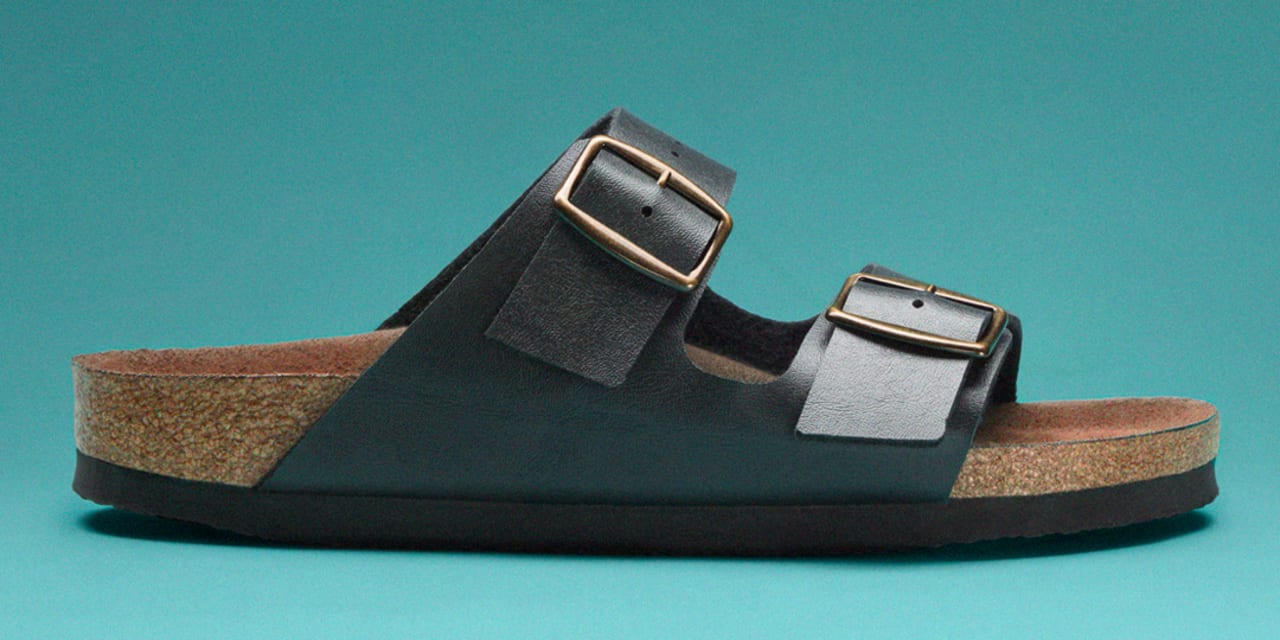Birkenstock plans to sell 32.3 million shares in a deal that values the European sandal-maker at $8.6 billion at the midpoint of the pricing range of $44 to $49 a share. Include debt and the enterprise value (market value plus net debt) could top $10 billion. The company plans to list under the ticker symbol BIRK.
It could be a hot deal, after pricing Tuesday night at $46 a share. Lead underwriters are
Goldman Sachs Group
(ticker: GS),
Morgan Stanley
(MS), and
JPMorgan Chase
(JPM).
How rich is it? The company would be valued at about 37 times earnings, Barron’s estimates.
By contrast,
Deckers Outdoor
(DECK), the maker of Uggs and Hoka shoes, trades at around $511 a share, or 22 times projected earnings in its fiscal year ending in March.
Crocs
stock (CROX), at around $87, trades for just seven times estimated 2023 earnings.
Dr. Martens,
the U.K. bookmaker with lightly traded U.S. shares (DOCMF), is valued at about 13 times estimated current-year earnings.
It’s hard to find any luxury-goods company with a similar valuation. One of the few is
Hermès International
stock (HESAY), which trades for about 45 times current-year earnings. Shares of the top luxury-good maker,
LVMH Moët Hennessy Louis Vuitton
(LVMUY), are valued at 22 times 2023 estimated earnings.
To arrive at our Birkenstock valuation, Barron’s took the company’s adjusted after-tax profits for the nine months ended June 30 of $193 million (Birkenstock reports its results in euros, and we made the currency adjustment), subtracted stock-based compensation, and then annualized that amount and divided by the 187.8 million shares that will be outstanding after the IPO.
We put the annualized adjusted earnings at about $232 million, or roughly $1.25 per share for the fiscal year that just ended in September.
Birkenstock adds back stock compensation to calculate its adjusted earnings, but there is no good reason for that considering that stock compensation is properly treated as an expense under generally accepted accounting principles and the IFRS accounting rules used by Birkenstock.
Notable investors like
Berkshire Hathaway
(
BRKb
) CEO
Warren Buffett
have said it’s ridiculous to exclude stock compensation from earnings. The argument in favor of excluding it is that stock compensation isn’t a cash expense and that other companies do the same thing.
Nonetheless, Birkenstock looks richly priced based on other valuation measures, as well. The company is valued at about 20 times earnings before interest, taxes, depreciation, and amortization (Ebitda) in the current fiscal year, against 15 for Deckers. Birkenstock is valued at about six times sales based on its enterprise value (market value plus debt) against Deckers at about three times.
Growth-stock investors don’t care much about book value, but it’s worth noting that Birkenstock has negative tangible book value.
Birkenstock, a popular brand that dates back to the 18th century, generated roughly 20% sales growth to $1.2 billion in the first nine months of its current fiscal year. Its revenue growth is about double that of Deckers, which has been powered by its Hoka shoes.
Birkenstock sees growth potential in Asia, where it has a small presence, as well as in what it calls underpenetrated European markets like the U.K. and France. Most buyers of Birkenstock sandals, which sell for about $100 a pair, are women.
But footwear—and clothing—is faddish. Look at parka-maker
Canada Goose Holdings
(GOOS), whose stock trades at $14.75, down from a 2019 high of 75.
Allbirds
(BIRD) makes woolly sneakers popular in Silicon Valley; its stock has collapsed to around $1, down from a post-IPO peak of $30 in 2021.
In the IPO prospectus, Birkenstock calls itself “a revered global brand rooted in function, quality and tradition dating back to 1774.”
Barron’s reporter Andy Serwer wrote more than a month ago that the IPO of the maker of “Teutonic-hippie-cum-hipster sandals is emblematic of what concerns not only culture vultures but also hardcore investors right now.” The sandals had a cameo in the Barbie movie.
Serwer noted that the IPO will be a big payday for the billionaire Birkenstock brothers Christian and Alex, as well as for the controlling shareholder, L Chatterton, a private-equity firm that bought the company at a $4.9 billion valuation in 2021. Existing shareholders paid an average price of about $17.50. New investors will pay more than double that.
Birkenstock has a buzzy and durable brand, but it’s going to have to sell a lot of sandals to justify the expected valuation.
Write to Andrew Bary at [email protected]
Read the full article here





